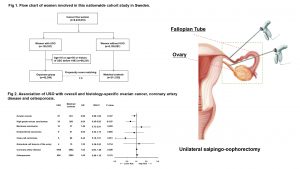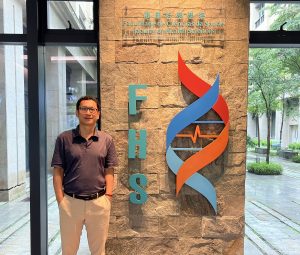An international research team jointly led by Ji Jianguang, professor in the Faculty of Health Sciences (FHS) at the University of Macau (UM), Yi Huan, associate professor at Fujian Maternity and Child Health Hospital of Fujian Medical University, and Jan Sundquist and Kristina Sundquist, professors at Lund University in Sweden, has discovered that opportunistic unilateral salpingo-oophorectomy (USO) can significantly reduce the risk of developing high-grade serous ovarian cancer (HGSOC) without increasing the risk of long-term complications. USO can serve as an alternative to bilateral salpingo-oophorectomy (BSO) or prophylactic bilateral salpingectomy. This groundbreaking research has been published in the prestigious journal PLOS Medicine.
Despite growing awareness of the importance of early diagnosis and screening, approximately 70% of ovarian cancer cases are diagnosed at an advanced stage due to the lack of effective screening methods at an early stage, and the incidence rate remains high. Current clinical guidelines recommend BSO as a surgical option for individuals at high risk of ovarian cancer. However, studies have reported that BSO in premenopausal women can lead to an abrupt decline in oestrogen, progesterone, and androgen levels. This can potentially trigger premature menopause symptoms, as well as having adverse effects on coronary artery disease (CAD) and bone health.
This large-scale registry-based study used nationwide clinical data from Sweden between 1993 and 2018. It revealed that premenopausal women under the age of 50 who underwent opportunistic USO experienced a 36% reduction in the risk of developing HGSOC during long-term follow-up while preserving endocrine function. The long-term follow-up results also confirmed that the surgery did not increase the risk of CAD or osteoporosis. This breakthrough evidence establishes opportunistic USO as a viable alternative to BSO or prophylactic bilateral salpingectomy for reducing the risk of ovarian cancer. It offers premenopausal women at high risk of ovarian cancer a surgical option that preserves endocrine function.
This study addresses the critical trade-off between reducing cancer risk and preserving endocrine function in premenopausal women, highlighting the significant role of USO in reducing ovarian cancer risk. Unlike traditional BSO, USO avoids the damage to cardiovascular and bone health, offering an optimised solution that balances cancer prevention with long-term quality of life. The study also provides robust evidence to inform the development of clinical guidelines for high-risk ovarian cancer populations.
The corresponding author of this study is Ji Jianguang, and the first author is Yi Huan. The research was funded by the Fujian Medical University Fund for Women and Children’s Hospital (File No.: 2021Y9180), and the University of Macau (File No.: UMDF-TISF/2025/001/FHS). The full version of the research article is available at: https://pmc.ncbi.nlm.nih.gov/articles/PMC12233271/.
| Source: Faculty of Health Sciences | |
| Media Contact Information: | |
| Communications Office, University of Macau | |
| Albee Lei | Tel: (853) 8822 8004 |
| Jason Leong | Tel: (853) 8822 8322 |
| Email: | prs.media@um.edu.mo |



